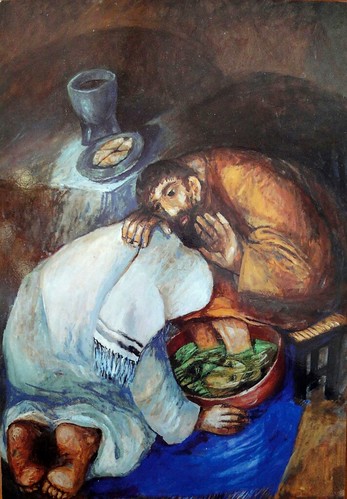 |
| Photo Credit: Jim Forest on Flickr.com |
Sermon Text:
Maundy Thursday 2016
St. Luke’s Church, Burlington
24 March 2016
Today’s Gospel reading from John differs
somewhat from the synoptic Gospels. Here
there are no words of institution from which we get our Eucharistic prayers.
But what is here, and what is missing from the other gospels is Jesus washing
his disciples feet, and giving them a new commandment.
The dinner is already in progress and Jesus
arises in the middle of the meal, puts a towel around his waist and starts to
wash his disciples feet.
Now we know that the tradition of washing
the feet was the standard operating procedure before any meal. People would
have been outside walking through filth during the day. Normally there would be
a servant stationed right at the door who would wash the guests’ feet as they
entered the house. This was the lowliest job conceivable, and it was usually
done by a slave because, as you can imagine it would be a pretty grim job.
People did not have the footwear that we use today.
Elliot, Sheila and Holly and I will be
washing the feet of some of our parishioners in imitation of what Jesus did,
but it can’t be nearly considered the same in terms of lowliness. Thankfully
probably most of the people’s feet that we are washing will have at least been
in shoes.
Pope Francis, last Maundy Thursday, went to
a prison to wash prisoners’ feet – prisoners from various faith traditions.
There perhaps we were getting closer to understanding the astonishment of the
disciples at Jesus’ action – especially Peter’s reaction.
The people who usually performed this duty
were the “nobodies” of their society. They would mostly just be unnoticed.
It is understandable that Peter objects.
“How can I let you be a slave to me?” “How can you wash my dirty feet?” “How
can I honour you, if I treat you like a slave?” It is beyond Peter’s
comprehension.
Jesus is doing here what he has done all
through his ministry: he is showing that he identifies with the poor, the
marginalized, the outcast, the slaves: the nobodies of this world.
That’s what so many of his parables were
about:
-
The Good Samaritan
-
The lost sheep
-
Lazarus and the rich man
-
The Mustard seed
-
The widow and the unjust judge
-
The Pharisee and the publican
That’s what so many of his healings were
about:
-
the 10 lepers
-
the woman with the hemorrhage
-
all the blind that were healed
-
Jairus’s daughter and the son
of the widow of Nain
-
The mute man
-
The epilectic boy
The list goes on – especially when you
consider that in Jesus’ society all of the sick were generally considered to be
outcast and sinners.
This identification of Jesus with the poor,
the outcast and the nobodies of the world is also what so many of Jesus’ words
were about:
-
Blessed are the poor, and
actually most of the rest of the beatitudes.
-
It is easier for a camel to go
through the eye of the needle than for a rich man to enter the Kingdom of
Heaven.
-
Except that you become as one
of these (little Children) you cannot see the kingdom.
-
The first shall be last and the
last shall be first
These are just some examples of how Jesus
identified and showed God’s preferential option for the poor and marginalized.
And now, by this action of washing his disciples feet, he is showing them,
symbolically, how he considers absolutely nobody a nobody.
Jesus through whom all things were created
considers no one to be beneath him. What an astounding truth.
So that is part one of Jesus’ lesson.
The second part is Jesus telling his
disciples, you must do the same for others.
And this is where it gets so difficult.
Because Jesus washing his disciples feet is such an intimate action. It
involved touch – the most intimate of the senses. And it involves caring for
the person in the most physical way, and in a very vulnerable and intimate way.
When Jesus models this for us, he wants us
to be involved in caring for others not only spiritually and morally, but
physically too. He wants us to care for the whole person. He wants us to roll
up our sleeves and get involved with people’s lives. And not only that, but
this is a commandment that Jesus gives us. It’s not an option. The commandment
is “new” because it isn’t just about loving one another. It’s about loving one
another as Jesus has loved us.
Who are the nobodies in our culture today?
The poor, the marginalized, the sick, the refugee, the outcast, the stranger,
the hungry, the lonely? When we understand Jesus’ example in washing his
disciples feet, we will truly understand Jesus’ commandment to us to love one
another. So I leave you with some questions: how will you be engaged in loving
the other? What things do we do at St. Luke’s which is reaching out in loving
care to the other? Who will you see that no one notices? What physical thing will
you do to make a difference in another’s life? When will you start? Amen.

No comments:
Post a Comment